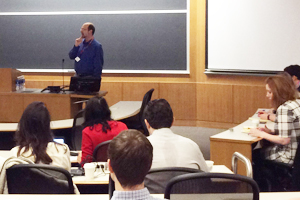IP Law and the Administrative State
BU Law’s Journal of Science & Technology Law Symposium explores how to bridge the gap between the federal courts and the US Patent & Trademark Office.

On February 24, Boston University School of Law was pleased to welcome intellectual property law scholars and practitioners from across the country to the Journal of Science and Technology Law Symposium: Bridging the Gap between the Federal Courts and the United States Patent & Trademark Office (USPTO).
The one-day symposium brought scholars and practitioners together to consider, among other topics, the Leahy-Smith America Invents Act (AIA) of 2011, which created several new administrative proceedings for resolving patent disputes. The law, signed by President Obama, represented a dramatic shift in policy that is still being negotiated among the new administrative body created by the AIA (the Patent Trial and Appeal Board, or PTAB), the US Court of Appeals for the Federal Circuit, and the US Supreme Court. The symposium also explored numerous issues of trademark law and procedure.
Frederick Tung, professor of law, associate dean for academic affairs, and Howard Zhang Faculty Research Scholar, opened the event by welcoming guests to explore how IP law and IP litigation interact with the administrative state. “The Journal of Science and Technology Law editors have gathered a terrific crew of scholars for what I’m confident will be an engaging and lively discussion,” he said.
Panels throughout the day focused on the relationship between the alternative proceedings created by the AIA and traditional proceedings in the courts, and the relationship between the Constitution and these administrative proceedings more generally. Featured papers explored patent examination, trademark registrations and oppositions, the role of patent agents versus attorneys, and the activities of the PTAB, among other topics.
BU Law’s Journal of Science and Technology Law is published twice per year, providing an outlet for scholarship at the intersection of science, technology, and the law. Subject matter encompasses biotechnology, computers, communications, intellectual property, the Internet, technology transfer, and business for science and technology-based companies. Professional articles, student notes, and legal updates appear in each print issue as well as online. Proceedings from this symposium will be published in a forthcoming issue of the Journal.
